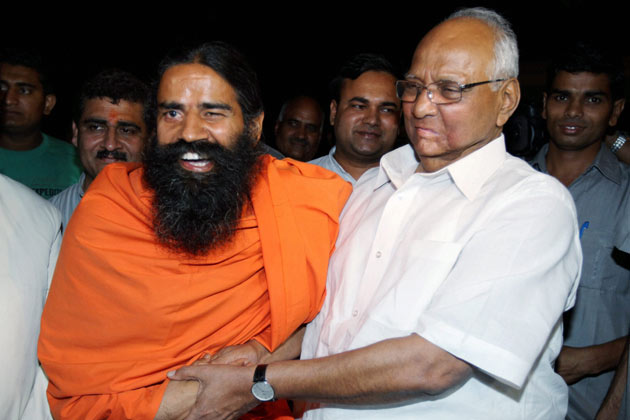
New Delhi, June 6: There has been a major embarrassment for the Congress. A day after the Prime Minister Manmohan Singh and Congress President Sonia Gandhi hit out at the civil society for targeting the Prime Minister, key UPA ally Sharad Pawar met Baba Ramdev and expressed support for his fight against black money.
"He (Baba Ramdev) has taken up the issue of black money. Till the money stashed away in foreign countries does not come out, there is no chance of eradicating poverty from the country," Pawar said.
After his meeting with Pawar, Baba Ramdev said, "The money flowing back to India would help in reducing the prices of petrol and diesel."
The Congress has had an uneasy relation with the NCP. A few delegates at the Congress Working Committee meeting had in fact suggested that the NCP was eating into the Congress vote bank.
Pawar's endorsement of Ramdev's campaign is bound to add to the Congress's discomfort. It is also bound to upset Pawar's old foe Anna Hazare. Team Anna is believed to be upset with Ramdev for stealing the show at Sunday's fast.
The Union Minister said he did not "smell politics" in Ramdev's campaign as he has announced that he will meet leaders of all political parties ranging from Congress chief Sonia Gandhi, CPI(M) general secretary Prakash Karat to AIADMK supremo Jayalalithaa and SP chief Mulayam Singh Yadav.
"He (Ramdev) has said he will meet responsible leaders in all the states and important persons who take key decisions. He has done one good thing that he has not spoken of any one party. He has talked about all parties and we liked this approach," Pawar said.
Pawar is among the 15 Union Ministers against whom Team Anna has levelled allegations of corruption.
Pawar said there was a need for everyone to examine how to adopt the path suggested by Ramdev and move forward. The Agriculture Minister said Ramdev made certain suggestions on changing tax laws.
He said the funds collected by the government through taxes was not enough to carry out development works as desired and hidden money can help in this regard.
"When this hidden money will come out, it will benefit all and help change the life of the common man," Pawar said.
Pawar said he first met Ramdev five-six years back at a yoga camp he had organised in his hometown. He said that he was impressed by Ramdev's ability to influence people and promote ancient Indian practices like yoga.
Pawar's meeting with Ramdev comes a day after the yoga guru met Bharatiya Janata Party (BJP) President Nitin Gadkari.





Comments
Add new comment